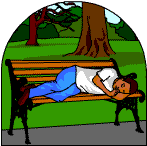Bivouacking
Created | Updated Jan 28, 2002

Described in the dictionary as, 'a temporary encampment often in an unsheltered area', bivouacing is a vital skill possessed by the more successful hitchhiker, mountaineer and long distance walker. Simply, it is the ability to find somewhere reasonably sensible to sleep every night. But bivouacking can be problematic. Firstly, you have to learn how to spell the word. B-i-v-o-u-a-c. Then you have to find a place to camp.
Finding a Site to Bivouac
This is extremely difficult, especially if it's already dark. Empty barns aren't as common as might be assumed. In the ideal case, you could knock on a farmhouse door and ask if you could sleep in the barn, but you are unlikely to receive a positive response. In urban areas, benches and bus stops will do fine. But don't be surprised if you wake up with a lapful of loose change. If you aren't too picky, a good place can be a public toilet.
If the weather is in a reasonable state, or if you have good equipment, there is nothing wrong in finding some random spot outdoors where you can lie down, preferably not where farm animals will come and sit on you, and not in the middle of a busy road.
The great thing about bivouacking, as opposed to camping with a tent, is that nobody really minds where you go. It is a good way of avoiding hefty fees at campsites.
Equipment
This very much depends on the climate you are in. In very warm weather you can get away with nothing except the clothes you're wearing. But in general, you will be surprised at how cold you get at night when you're not moving around. A thick sleeping bag is usually a good bet. Wear clothes too; as well as keeping you warm, this helps a quick and indiscreet getaway if you wake up and find you've camped on somebody's front lawn.
An interesting item is the bivouac bag. These are sold at most camping shops, but some folk are of the opinion that they're not really worth buying. Those of this opinion say that if you do use a bivouac bag, you'll get the impression that the designer has never even looked outside. They are generally a sheet of plastic; the idea being to fold it over you, acting as both a groundsheet and a cover. This often doesn't work. The bag is invariably too small, and so doesn't cover your sleeping bag, and lets in huge drafts.
Some bags are closed at one end and both sides, solving this problem, but it means that there is no ventilation, and you will wake up soaked through with dew and sweat. It is truly incredible the amount of water that appears, in hot or cold weather.
Unfortunately, there is no fantastic material yet invented which will stop rain coming in but let air circulate. And so you need to find a sheet of material to fit your climate and needs. The best all-round material is probably a large sheet of tarpaulin. It is a strengthened plastic material which is extremely difficult to rip. It is important not to have even the slightest hole, or you will be soaked as soon as it starts raining.
The sheet needs to be very large. It needs to cover you and your rucksack, and act as a groundsheet too. There must be enough extra to fold inwards at the sides and bottom to close in better; and have plenty extra as well so you can move about and rumple it up for better ventilation.
Another useful piece of equipment is some sort of carry mat. This provides insulation between you and the ground, which can get surprisingly cold.
Make sure you have plenty of extra clothing. This means that if you get cold, you can put more on; and if it gets hot, you can remove a layer. Spare clothes, put inside your rucksack, also make a useful pillow.

